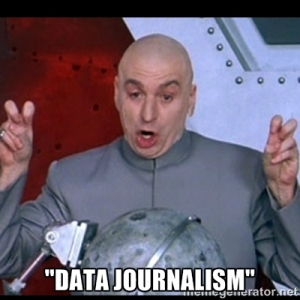Hi everybody, let’s talk about Data Journalism. No, I’m not referring to the data on your Smartphone that allows you to WhatsApp your girlfriend or download pictures of naked girls from some shady porn site; but rather the technologies used in the journalistic industry to improve storytelling by media workers. And more importantly, we’ll also be looking at whether South African journalists should jump on the bandwagon and embrace the data journalism experience.

Firstly, what on Earth is data journalism?
Data Journalism can simply be described as the use of quantitative research processes, in order to gather and generate news stories for publication.
Data can be in the form of statistics, reports, excel spreadsheets and the like, which journalists use for the purpose of substantiating statements made in a news or investigative piece and help audiences understand why they have chosen a particular stance on any given issue.
The information selected and the way words are phrased can have a huge impact on audiences and can determine how an individual story is perceived by audience members.

Does this mean that I’ve been manipulated by the media all this time? Well…..maybe.

Although data journalism has a lot to do with online and technological resources; this does not mean that Google should be your go-to guy for everything from searching the web about anything from the recent protests that occurred at UCT, to Kylie Jenner’s latest moustache implants.
Google and similar search engines should simply be used to verify certain information that you, or your audience might need clarity on, and help you in the research process for any given writing piece used for publication.
In 2011, The Guardian wrote a wonderful piece about what data journalism is, and the importance thereof in our industry.
‘Data’ can also be information obtained from an interview, the library, or even form your own first-hand observations of a particular scene unfolding.

Newsrooms are evolving and audience members are no longer looking to traditional forms of media for information purposes and are more inclined to explore online platforms for their ‘fix’ of the news; simply put, news is fast, hip and happening. The development of technology has indisputably had a lot to do with this.

South African journalists need to come to the realisation that data journalism is a must for the development of our media industry and can actually improve the quality and quantity of news that gets produced for public consumption.
Not only can data journalism help create deeper insights into already existing or developing stories, but it can also assist in the visualisation and decoding of information, helping audience members comprehend both filtered and non-filtered facts.
Moreover, statistics such as unemployment, teen pregnancy and the national crime-rate can also be put into perspective by the use of information and communication technologies (ICT’s) and other data journalism resources.
Data journalists are also a very sought-after breed in the journalistic world, making their experience and presence in the newsroom almost indispensable.
Well, there you have it folks; data journalism is a definite must for the development of the media cycle and the generation of high quality news pieces. For better or worse: we need to embrace the digital era!

Well researched piece. Love your writing stuff, really informed me about the digital age and data
LikeLike
Shukran, data and digital journalism will always be here and is essential for successful content generation
LikeLike
Haha,a wonderful intro. I had to keep reading.
LikeLike
Gracias 🙂
LikeLike
Excellent topic of how you shouldn’t just use the first search as your major source, and how you should interrogate data even further to find your story
LikeLike
I always enjoy reading pieces that educate me without being too serious! I had a good chuckle while reading your piece…nicely written, Kauthar 🙂
LikeLike
Ouch, and I thought I was sarcastic. The intro was really attractive with you making some valuable points.
LikeLike
Thank you guys. Data journalism is the future yo. Eish, this topic was hard, but we made it!
LikeLike
HIER….is besteld!Ernst Jan, ik heb het je al eerder geschreven, maar nu toch nog maar een keer: als afronding van het gehele proces hoop ik écht wel dat ook jij HIER gesigneerd hebt!Op een mooie zonnige avond, met BLØF als muzikale omlijsting, samen met de mannen de bestelde boeken sig&#ren&e8230;n#8230;….dat moet lukken!
LikeLike